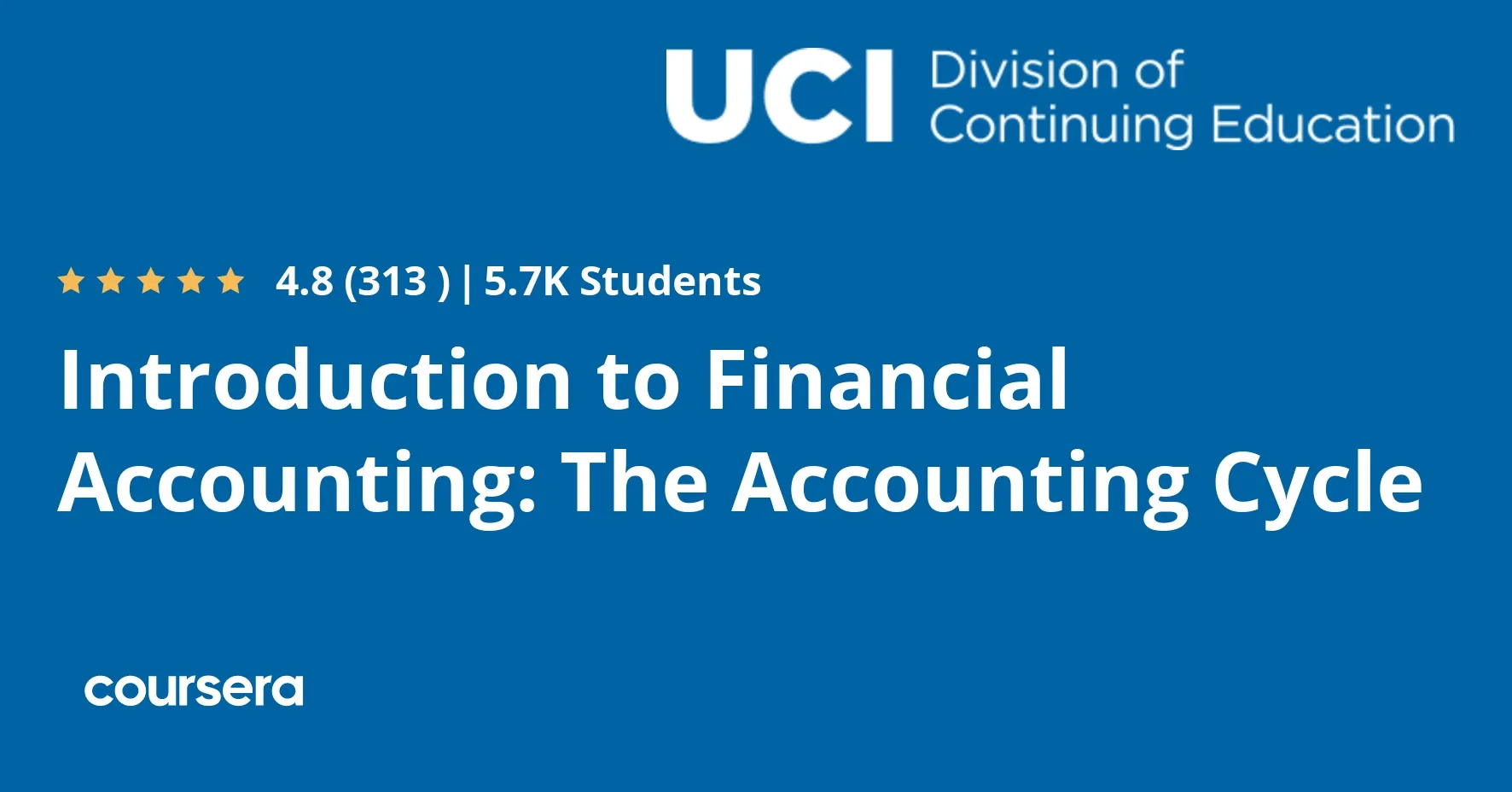
Introduction to Financial Accounting: The Accounting Cycle 
This Specialization introduces learners to the fundamentals of financial accounting, providing hands-on practice in completing the accounting cycle within Microsoft Excel. Through this course, learners will gain the knowledge and skills to analyse and record financial transactions, culminating in the start of a new fiscal year. ▼
ADVERTISEMENT
Course Feature
![]() Cost:
Cost:
Free Trial
![]() Provider:
Provider:
Coursera
![]() Certificate:
Certificate:
No Information
![]() Language:
Language:
English
Course Overview
❗The content presented here is sourced directly from Coursera platform. For comprehensive course details, including enrollment information, simply click on the 'Go to class' link on our website.
Updated in [March 06th, 2023]
This course provides an introduction to the accounting cycle, including how to record in journals and post in ledgers, how to prepare financial statements, how to record and post closing entries, and how to prepare trial balances. Participants will gain an understanding of the fundamentals of financial accounting and the importance of the accounting cycle. The course will cover topics such as the accounting equation, double-entry bookkeeping, and the preparation of financial statements. Participants will also learn how to record and post closing entries and prepare trial balances. By the end of the course, participants will have a comprehensive understanding of the accounting cycle and be able to apply the concepts to their own business.
[Applications]
After completing this course, students should be able to apply the knowledge they have gained to their own accounting practices. They should be able to record transactions in journals and post them in ledgers, prepare financial statements, record and post closing entries, and prepare trial balances. Additionally, they should be able to use the accounting cycle to analyze and interpret financial information.
[Career Paths]
1. Financial Accountant: Financial Accountants are responsible for preparing and analyzing financial statements, maintaining accurate records, and ensuring compliance with applicable laws and regulations. They also provide advice and guidance to management on financial matters. As the global economy continues to evolve, the demand for Financial Accountants is expected to increase, as businesses need to stay up-to-date with the latest financial regulations and trends.
2. Tax Accountant: Tax Accountants are responsible for preparing and filing tax returns, as well as providing advice and guidance to clients on tax-related matters. They must be knowledgeable about the latest tax laws and regulations, and must be able to interpret and apply them to their clients’ situations. As the global economy continues to become more complex, the demand for Tax Accountants is expected to increase.
3. Internal Auditor: Internal Auditors are responsible for conducting audits of an organization’s financial records and internal controls. They must be knowledgeable about the latest accounting standards and regulations, and must be able to identify and report any discrepancies or irregularities. As organizations become increasingly complex, the demand for Internal Auditors is expected to increase.
4. Financial Analyst: Financial Analysts are responsible for analyzing financial data and providing advice and guidance to management on financial matters. They must be knowledgeable about the latest financial trends and regulations, and must be able to interpret and apply them to their clients’ situations. As the global economy continues to evolve, the demand for Financial Analysts is expected to increase.
[Education Paths]
1. Bachelor of Science in Accounting: This degree path provides students with a comprehensive understanding of the principles of accounting, including financial reporting, taxation, auditing, and financial management. Students will learn how to analyze financial data, prepare financial statements, and use accounting software. Additionally, they will gain an understanding of the legal and ethical aspects of accounting. This degree path is becoming increasingly popular as businesses become more reliant on accurate financial data.
2. Master of Science in Accounting: This degree path is designed for students who want to specialize in a particular area of accounting, such as taxation, auditing, or financial management. Students will learn advanced accounting principles and techniques, as well as how to use accounting software. They will also gain an understanding of the legal and ethical aspects of accounting. This degree path is becoming increasingly popular as businesses become more reliant on accurate financial data.
3. Master of Business Administration (MBA) with a Concentration in Accounting: This degree path is designed for students who want to gain a comprehensive understanding of business and accounting principles. Students will learn how to analyze financial data, prepare financial statements, and use accounting software. Additionally, they will gain an understanding of the legal and ethical aspects of accounting. This degree path is becoming increasingly popular as businesses become more reliant on accurate financial data.
4. Doctor of Philosophy (PhD) in Accounting: This degree path is designed for students who want to pursue a career in research or academia. Students will learn advanced accounting principles and techniques, as well as how to use accounting software. They will also gain an understanding of the legal and ethical aspects of accounting. This degree path is becoming increasingly popular as businesses become more reliant on accurate financial data.
Course Syllabus
What is Financial Accounting?
Recording in Journals & Posting in Ledgers
Completing the Accounting Cycle
Course Provider

Provider Coursera's Stats at AZClass
This specialization introduces learners to the fundamentals of financial accounting, providing practice in completing the accounting cycle in Microsoft Excel. Through this course learners will acquire the knowledge and skills to analyze and record financial transactions, culminating in the beginning of a new financial year. Accounting Cycle is a must-have course for anyone wishing to gain a better understanding of the fundamentals of financial accounting. This course covers the accounting cycle, from recording and posting transactions in a journal to preparing financial statements and closing entries. Learners will understand the basics of double-entry bookkeeping, journal entries, debits and credits, and balance sheets.
Discussion and Reviews
0.0 (Based on 0 reviews)
Explore Similar Online Courses

AI Business & the Future of Work

Android Performance

Python for Informatics: Exploring Information

Social Network Analysis

Introduction to Systematic Review and Meta-Analysis

The Analytics Edge

DCO042 - Python For Informatics

Causal Diagrams: Draw Your Assumptions Before Your Conclusions

Whole genome sequencing of bacterial genomes - tools and applications

Goods and Service Tax in India : A Brief Introduction

The Basics of Business Accounting


Start your review of Introduction to Financial Accounting: The Accounting Cycle